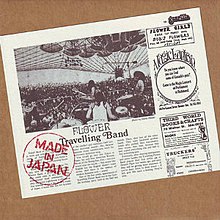Heaven and Hell may refer to:

Lighthouse is a Canadian rock band formed in 1969 in Toronto, Ontario, whose repertoire included elements of rock music, jazz, classical music, and swing and featured horns, string instruments, and vibraphone. They won Juno Awards for Best Canadian Group of the Year in 1972, 1973, and 1974.
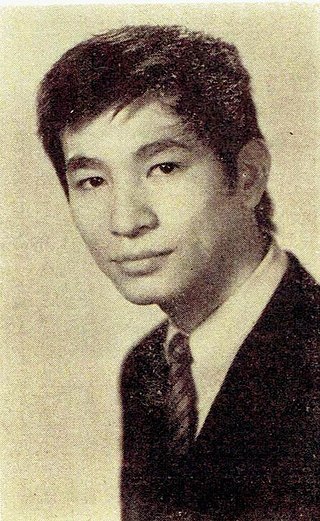
Yuya Uchida was a Japanese singer, record producer, and actor. With a career spanning six decades, he was a major figure in Japanese popular music.

Flower Travellin' Band was a Japanese rock band that was formed in 1967. They were connected to Japan's counterculture movement and noted for their mixture of early heavy metal with psychedelic and progressive rock. They received wide acclaim from critics but failed to achieve commercial success and separated in 1973 to pursue individual careers. The band reunited in late 2007, but permanently disbanded after the 2011 death of vocalist Joe Yamanaka.
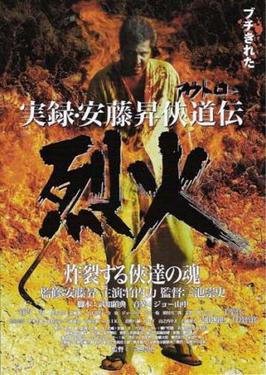
Deadly Outlaw: Rekka, also known as Violent Fire, is a 2002 Japanese yakuza film directed by Takashi Miike starring Riki Takeuchi and Sonny Chiba. Known in Japan as Jitsuroku: Andō Noboru Kyōdō-den - Rekka, it is loosely based on actor Noboru Ando's former life as a yakuza.

Japrocksampler: How the Post-war Japanese Blew Their Minds on Rock 'n' Roll is a book written by author and musician Julian Cope and published by Bloomsbury on 3 September 2007.
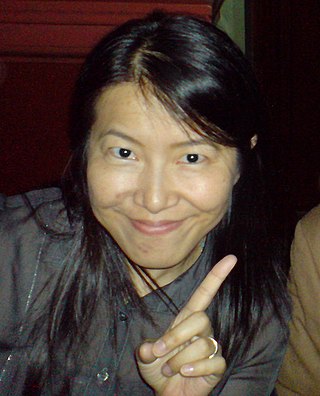
The music of the Kingdom Hearts video game series was composed by Yoko Shimomura with orchestral music arranged by Kaoru Wada. The original soundtracks of the games have been released on three albums and a fourth compilation album. The soundtracks to the Kingdom Hearts games feature several musical pieces from both Square Enix and Disney works, including such pieces as "Mickey Mouse Club March" by Jimmie Dodd, "This Is Halloween" by Danny Elfman, and "One-Winged Angel" by Nobuo Uematsu. They also feature several vocal songs, the most notable being the four main theme songs: "Hikari", "Passion", "Chikai", and "Face My Fears." The two themes were written and performed by Japanese American pop star Hikaru Utada; in addition to Japanese, English versions of the first three songs were produced, titled "Simple and Clean", "Sanctuary", and "Don't Think Twice", respectively.

Break Through is the third studio album by the Japanese rock duo B'z. The album debuted at number 3 on the Oricon Weekly Albums Chart, being their last studio album not to reach number 1. It sold 41,700 copies in its first week and sold a total of 724,640 copies during its chart run. It was eventually certified Million by the RIAJ in January 1994.

Satori is the second album by Japanese rock band Flower Travellin' Band, and their first of original material. It was released in Japan by Atlantic Records in 1971 and in the US and Canada by GRT Records.

We Are Here is the fifth and final album by Japanese rock band Flower Travellin' Band, released in September 2008 by Pony Canyon Records. It is their only album after reuniting in November 2007 and the only one to feature keyboardist Nobuhiko Shinohara as a full member. We Are Here peaked at number 299 on the Oricon chart.
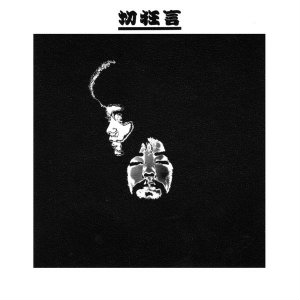
Kirikyogen is a 1970 album by Japanese musician Kuni Kawachi, credited to "Kuni Kawachi & His Friends", though it is usually credited to "Kuni Kawachi & Flower Travellin' Band" on bootlegs. The album showcases Kuni Kawachi's progressive rock influences, as well as the growing heavy metal sound that the Flower Travellin' Band were honing.
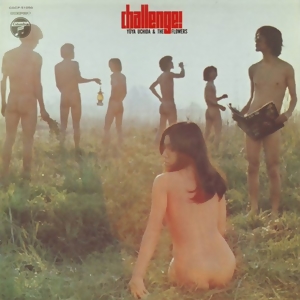
Challenge! is the debut studio album by Japanese rock band Flower Travellin' Band, then called Yuya Uchida & The Flowers, released in 1969. It features mainly cover songs, and was a means for Yuya Uchida to explore the emerging psychedelic rock movement outside his own career, and to introduce the work of upcoming Western bands such as Cream, Big Brother and the Holding Company, The Jimi Hendrix Experience, Jefferson Airplane to a Japanese audience. It was named number 34 on Bounce's 2009 list of 54 Standard Japanese Rock Albums.

Anywhere is a 1970 album by Japanese rock band Flower Travellin' Band. It was their first release under the Flower Travellin' Band name and the first to feature the classic line-up of Joe Yamanaka, Hideki Ishima, Jun Kozuki and Joji Wada.
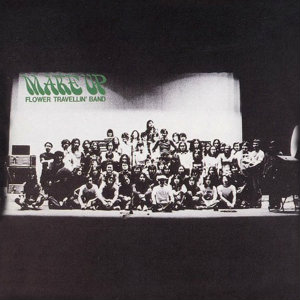
Make Up is the fourth album by Japanese rock band Flower Travellin' Band, released in February 1973. It is a double album, featuring both live and studio recordings.
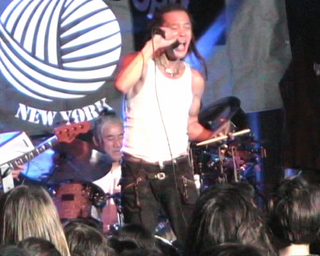
Akira Yamanaka, better known as Joe Yamanaka (ジョー山中), was a Japanese singer and actor. He is known for both his work with Flower Travellin' Band and as a solo musician; singing at a vocal range of three octaves. As an actor, he appeared in many television shows and movies, such as Blackmail Is My Life (1968), Proof of the Man (1977), Zatoichi (1989) and Deadly Outlaw: Rekka (2002).

Hideki Ishima is a Japanese musician, known primarily for his work with Flower Travellin' Band and for creating the sitarla instrument. A guitarist and sitar player for nearly forty years, he now exclusively plays the sitarla, an instrument he invented in 2000 that combines aspects of a sitar with an electric guitar. Guitarists Akira Takasaki, Rolly, and Mikael Åkerfeldt have cited him as an influence.
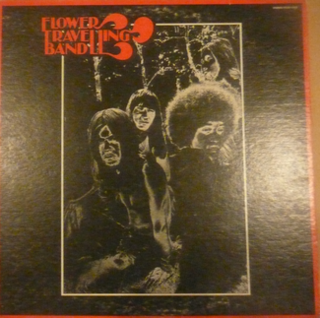
Satori is an album released by Flower Travellin' Band in Canada. It featured tracks from the original Japanese release of Satori, Made In Japan, and an additional track only available on the Canadian single release of Satori. The songs featured from Satori were remixed and edited considerably. The album was produced by Paul Hoffert of Lighthouse.
Japanese metal is heavy metal music from Japan. The country's first metal bands formed in the mid-to-late 1970s. The number of acts increased significantly in the next decade, but only a few saw their material released internationally, including Europe and North America with their pre-established metal bases. Domestic metal saw its commercial peak in Japan in the late 1980s and early 1990s, with the top acts selling millions of records. Many metal bands from the visual kei scene toured and gained recognition in the West in the 2000s. The 2010s saw a boom of all-female metal bands form and gain mainstream attention.
Japanese rock, sometimes abbreviated to J-rock, is rock music from Japan. Influenced by American and British rock of the 1960s, the first rock bands in Japan performed what is called group sounds, with lyrics almost exclusively in English. Folk rock band Happy End in the early 1970s are credited as the first to sing rock music in the Japanese language. Punk rock bands Boøwy and The Blue Hearts and hard rock/heavy metal groups X Japan and B'z led Japanese rock in the late 1980s and early 1990s by achieving major mainstream success.
